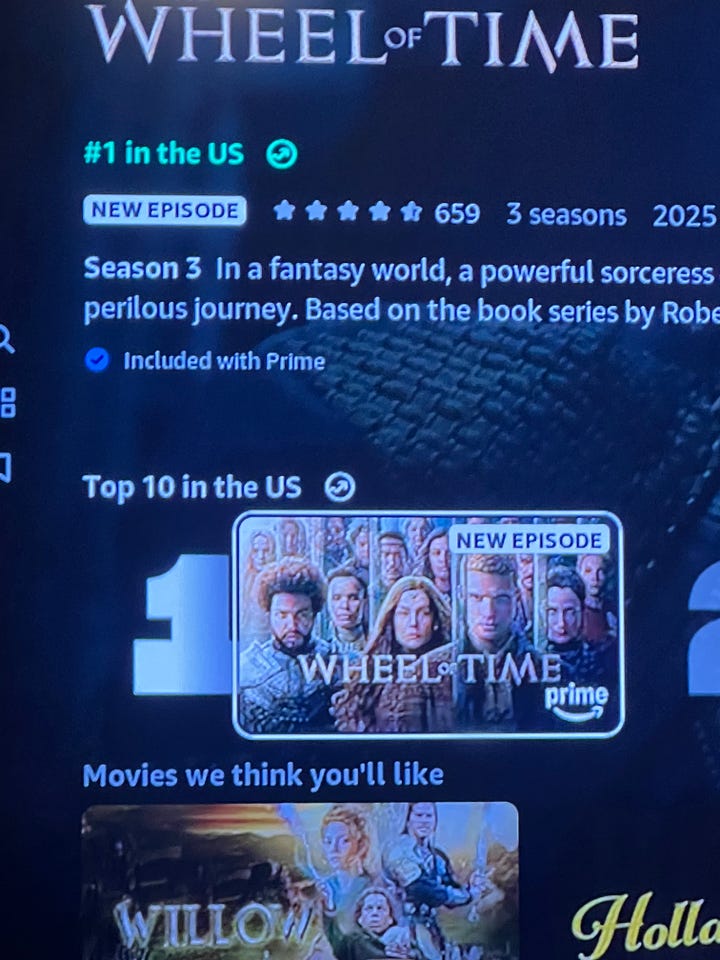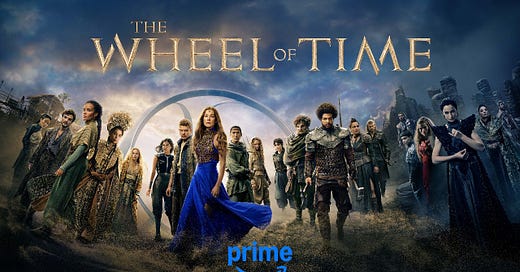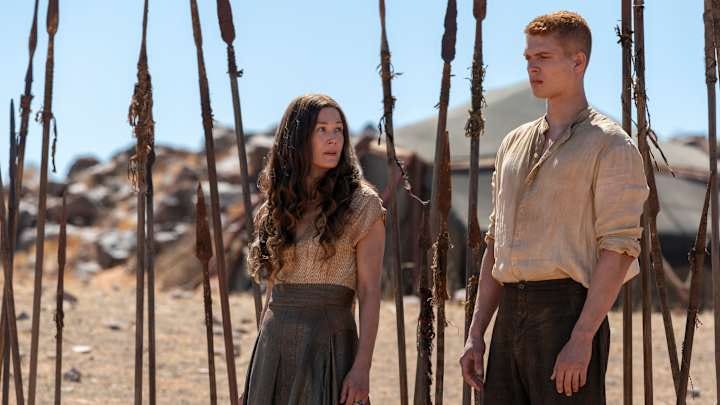She Would Have Loved This Turning of the Wheel
A Bonus essay on what the Wheel of Time cancellation is teaching me about grief, capitalism, and fandom
A Bonus Essay
This issue wasn’t planned — but it arrived with force. It surprised me too.
On memory, media, and what it means when the Wheel stops turning.
A few weeks ago, I posted in a Wheel of Time Facebook group that I was considering a 24(ish)-hour rewatch of all three seasons over Memorial Day weekend. Then, Friday, the news dropped: Prime was canceling the show. I did the rewatch anyway.
It was bittersweet. More bitter than sweet.
I came to The Wheel of Time through Mimi. My aunt. My anchor. A writer, an artist, and a genre devotee who picked up the first book in 1990 on her way to a cruise and never looked back. Years later, after I’d devoured Game of Thrones like the rest of the world, she said, “If you like that, you should really give Wheel of Time a try.”
So I did. And I was hooked.
But it wasn’t the GoT comparison that captured my interest — it was the Dune connections. At this point, I’ve taken to describing WoT as Dune, but Make it Fashion Fantasy. Now, this only works because Dune is re-centered in the cultural zeitgeist (more on that later). But the parallels are there and pretty obvious — a tapestry of science-magic, political witches, messianic inheritance, and gendered power struggles. The same empire and prophecy, stitched into a world of braids, channeling, and fantasy drag.
I loved it immediately. So did Mimi. She read the series across decades. Grieved when Robert Jordan died before he could finish his great work. Side-eyed Brandon Sanderson stepping in. Took a break. I talked her into picking it back up, and we made a pact: we’d read the final three books together.
She died before we could. I read them alone. And cried more than once.
She would’ve loved and hated the show. Between the two of us, she would have leaned more Bookcloak. I mostly loved it. Mostly.
Between the two of us, she would have leaned more Bookcloak. I mostly loved it.
Her takes were always layered — a lover of source material, but never precious about it. I was more forgiving in the messy work of adaptation. Diversifying the cast? Brilliant. Aging the main characters slightly to allow deeper romance plots? Smart. Giving Rosamund Pike space to anchor the narrative? Yes, obviously. Queerness woven in as ordinary, unremarkable, beautiful? Perfect. Those were changes Mimi and I would have celebrated together.
But there were missteps, too— the things we would have gone back and forth over endlessly. Fridging Perrin’s wife. The colorism and quiet violence of casting more dark-skinned BIPOC actors as villains and more light-skinned BIPOC actors as heros — why is that still happening? Giving the show eight episodes per season instead of ten. Dropping new seasons every other year. And worst of all: the total lack of marketing. Wheel of Time had the bones of the next big fantasy franchise — and they left it to starve in a dark corner of the algorithm.
Still. Season 3 was a revelation. One of the best seasons of fantasy TV ever made. At least two episodes — depending on who you ask — deserve to be ranked among the best episodes of television this year, period.




Which makes the cancellation feel cruel. But not surprising.
This is what happens when our culture is held hostage by capital — when art is treated not as craft or communion, but as content. When the measure of worth is how fast something trends, not how deeply it resonates. When the drive for profit-making overtakes even making profitable art.
This is what happens when our culture is held hostage by capital — when art is treated not as craft or communion, but as content.
The people making these decisions aren’t storytellers. They don’t love these worlds. They don’t care what it meant for a Black girl to see herself in Nynaeve. Or what it meant to watch Moiraine teach power and sacrifice with a moral heat like dry ice — cold enough to burn. They care about margins. And when a show doesn’t spike in its first week, it’s deemed a failure — no matter the complexity, no matter the care.
Blaming “wokeness” is easy. But the truth is simpler — and crueler. It was about metrics. Monetization. The show was underfed, under-marketed, and ultimately deemed unworthy of the Factory’s attention.
Even Ta’Veren can’t escape capitalism.
Even Ta’Veren can’t escape capitalism.
I canceled my ad-free Prime the moment I heard — fitting, since I’d only started it for Season 3. I’m canceling Prime altogether soon. (Don’t ask if my household has a backup subscription — just let me have this moment.)
There’s still a sliver of hope. Sony, the show’s co-producer, owns the rights and could shop it to another streamer. HBO. AppleTV. Anywhere that might recognize what this show could still become. But the mood has shifted. Fans aren’t asking for a rescue — they’re calling for a reckoning.
The warning signs were already there. A renewal should’ve come around this time last year. With the time needed for scripting, production, and post, the quiet had already started to speak. The time lost to strikes, stalled momentum, and platform indifference may have sealed the show’s fate long before Season 3 delivered a triumph that masked the unraveling Pattern beneath.
What makes this harder is that the work itself was daring and full of heart. Rafe Judkins and the creative team took on an impossible adaptation — and made something textured, surprising, and resonant. The cast gave performances that will echo long after the screen goes dark — from Rosamund Pike’s cold fury to Josha Stradowski’s generational devastation, from the young leads holding the weight of prophecy to the veterans who made the Pattern feel ancient and alive. And the fandom — especially some of my favorites like Ali and Gus of Wheel Takes and Jon at WoT UP — carried the torch with sharpness, humor, and care. This was never just a show. It was a world we built together. They all carried something sacred. They deserved more. So did we.
This was never just a show. It was a world we built together. They all carried something sacred. They deserved more. So did we.
It shouldn’t have been this way.
I wish Mimi were here so we could be bitter together — critique layered on snide comment layered on rhetorical question layered on withering observation layered on a loud sigh, and finally, a snort that said everything. We watched so many things this way — pausing the TV to look at each other, eyebrows raised, eyes wide, then sliding into cackles. This is how we loved the art. This is how we loved each other.
Around hour 14 of the marathon rewatch, I made coffee for the first time since she died. I’m usually a tea person, but for her, coffee was Ritual. Always, the color of weathered parchment, two heaping spoons of Sugar in the Raw, and just a touch of cinnamon — like a secret. I stirred slowly, clockwise. I lit a candle. I felt the ache of endings that come too soon, and the fire of stories that still deserve to be told.
Notes from the Margins
This piece wasn’t on the schedule. But neither was the cancellation.
I’ve been working on a piece about the importance of June in my life (look for it around June 9th), which has me thinking a lot about men and masculinity and what masculinity means in our current moment… which has me also working on other things. But this one demanded its own space — both as tribute and as refusal.
Consider it a detour born from devotion. The wheel turned. So did I.
What’s in Motion
While Freedom & Desire is my heart-work, I’m also tending to the bones and breath of systems.
INTERSECT is gearing up for Pride Month with our LGBTQIA2s+ Allyship in 2025: How to Actively Resist Homophobia and Transphobia training. And keep your eye out for a new offering specifically about providing services to trans folks in July.
Catch Your Breath Community Calls with INTERSECT
The Body Trust Podcast — Our latest episode is about one of my favorite topics:
cults!high control groups. Okay, it’s about Overeaters Anonymous. And the next one will be about fat fashion!Both INTERSECT and I are booking fall trainings and talks on fat liberation, gender justice, and cultural strategy. Reach out here if you want to collaborate.
Even when the wheel breaks, the work continues.
Further Reflection
Who introduced you to a story you now carry?
What endings still ask something of you?






